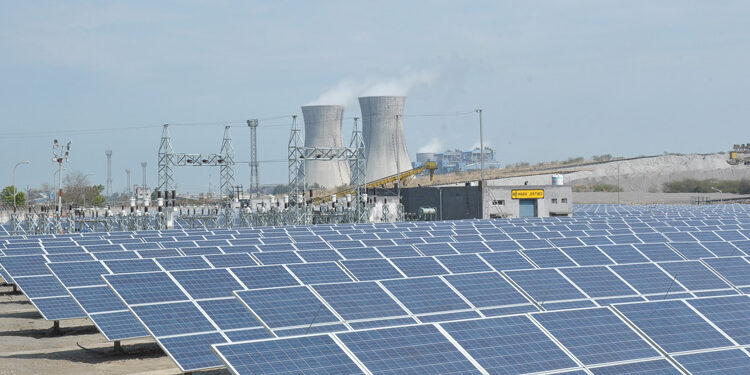Angola’s recent shift to renewable resources is a bold, future-oriented vision, marking an important turning point in the nation’s economic trajectory.
This strategic reorientation, led by the Minister of Mineral Resources, Oil and Gas, Diamantino Azevedo, represents a commitment to a sustainable and resilient economy, capable of adapting to the challenges of the 21st century.
Historically, Angola has been heavily dependent on oil, with export revenues from the product in 2012 representing an impressive 97% of the Government’s total export revenues.
The volatility of the international oil market left Angola vulnerable to global economic shocks. Its economy, which has suffered six consecutive years of recession, was particularly affected by the sharp drop in oil prices, resulting from the decrease in energy demand in the context of the Covid-19 pandemic.
The impact was such that the country’s debt was expected to increase to more than 130% of GDP by the end of 2020.
A recent study by the Carbon Tracker Initiative further highlighted the need for Angola to diversify its economy.
The study concluded that countries that depend on fossil fuel revenues could experience an average drop of 46% in oil revenues over the next 20 years due to initiatives aimed at meeting the Paris Agreement’s emission targets. This economic reality serves as a warning for Angola and other oil-dependent nations.
However, in the face of these challenges, Angola is demonstrating resilience and vision. In recent years, the share of oil in the country’s GDP has begun to decline, falling from 33% in 2018 to 28.9% in 2021. Furthermore, the World Bank predicts that non-oil activities, supported by its Oil Acceleration Project Economic Diversification and Employment Creation, worth US$300 million, will continue to grow in the coming years.
Angola’s current energy mix reflects its commitment to renewable energy, with hydroelectric energy representing 68%, fossil fuels 31.3% and a hybrid of solar energy and fossil fuels 0.7%. But there is room for growth, particularly in solar energy.
At the G7 Summit in Germany in June 2022, US President Joe Biden announced a partnership between Angola and US-based project development companies to mobilize US$2 billion for a solar project in Angola. This ambitious project includes the development of solar mini-grids, domestic energy kits and solar energy for telecommunications.
The potential for solar energy in Angola is vast. With abundant sunshine and an estimated global annual horizontal solar radiation of 1,370-2,100 kWh per square meter per year, the country could potentially harness up to 55 GW of solar capacity.
Hydroelectric energy is also very promising for Angola. Although only 20% of its production capacity, estimated at 18.2 GW, is being used, hydroelectric power is expected to contribute to a substantial part of the country’s energy supply.
The Angolan Government’s commitment to ensuring that renewable energy represents 70% of the country’s energy mix by 2025 would not only take advantage of this underutilized potential, but would also help to reduce carbon emissions by up to 14% by the year 2030.
As one of Africa’s emerging economies, Angola’s Renewable Energy sector also serves as a catalyst for job creation.
The International Energy Agency estimates that, by 2030, the Renewable Energy sector will have created 25 million jobs worldwide. As Angola continues to invest in renewable energy, it could benefit significantly from this trend.
However, developing a local workforce with the skills and knowledge needed to support the Renewable Energy sector remains a critical challenge.
Investment in education and training will be crucial to closing these knowledge gaps and ensuring that Angola can fully benefit from its renewable energy revolution.
This could lead to job creation in a wide range of fields, from Engineering and Construction to Maintenance and Operations, promoting inclusive growth and reducing income inequality.
Angola’s shift to renewable resources also has the potential to redefine its international economic relations. Although China has been an important trading partner, especially with regard to oil exports, the transition to renewable energy could open up new partnership opportunities with Western countries.
In 2021, the UK’s trade envoy to Angola, Lawrence Robertson, spoke about how the UK supported Angola’s transition to a green economy and how this could create new opportunities for British companies.
President João Lourenço’s recent visits to France, Portugal and Italy in recent months highlight Angola’s growing ties with European nations. These relationships could facilitate the transfer of advanced technologies and knowledge needed to develop Angola’s renewable resource potential.
Angola’s focus on renewable resources positions it uniquely in Africa. As many African countries remain dependent on a narrow range of exports, Angola’s diversification could become a model for sustainable economic development in the region.
Angola’s shift to renewable natural resources represents a beacon of hope in a difficult economic scenario. The country’s commitment to sustainability, economic diversification and global partnership are fundamental pillars of a robust and resilient economy and other African nations should start taking note.
The journey ahead is undoubtedly fraught with obstacles, but with strategic planning and international cooperation, Angola is well positioned to navigate its path towards a prosperous and sustainable future.
![]()




